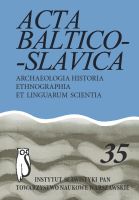Zmiany sytuacji językowej w Wierszynie koło Irkucka w warunkach dwujęzyczności polsko-rosyjskiej
Changes in the language situation of Vershina near Irkutsk in the conditions of Polish-Russian bilingualism
Author(s): Michał GłuszkowskiSubject(s): Language and Literature Studies
Published by: Instytut Slawistyki Polskiej Akademii Nauk
Keywords: Vershina; Syberia; minority; language situation; language island; Polish; Russian
Summary/Abstract: Vershina was founded in 1910 by Polish voluntary settlers from Lesser Poland. There are three main periods in Vershina’s history, with different social conditions affecting the language choice. During its first three decades the settlers preserved Polish language (a mixture of dialects from their regions of origin), traditions and the Roman Catholic religion. The effects of the Revolution of 1917 and political changes came to a village in taiga only in the late 1930’s. Vershina lost its former ethnocultural homogeneity because of Russian and Buryat workers in the local kolkhoz. It was the beginning of the increasing role of Russian language in the village’s life. The process of intensive sovietization as well as heterogeneous marriages affected language choice in many domains. In the late 1980’s the inhabitants of Vershina regained their minority rights: they can pray in their own church, learn Polish in a local school and found cultural organisations. However, during the years of communism, the language situation changed irreversibly. There are some factors which may hinder the increasing domination of Russian language, such as activity of local Polish organisation, Roman Catholic parish and folk group “Jazhumbek” but their influence is limited.
Journal: Acta Baltico Slavica
- Issue Year: 2011
- Issue No: 35
- Page Range: 13-27
- Page Count: 15
- Language: Polish

